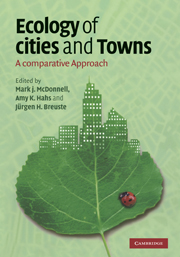Book contents
- Frontmatter
- Contents
- List of contributors
- Preface
- 1 Introduction: Scope of the book and need for developing a comparative approach to the ecological study of cities and towns
- Part I Opportunities and challenges of conducting comparative studies
- Part II Ecological studies of cities and towns
- Part III Integrating science with management and planning
- Part IV Comments and synthesis
- 30 What is the main object of urban ecology? Determining demarcation using the example of research into urban flora
- 31 How to conduct comparative urban ecological research
- 32 Ecological scientific knowledge in urban and land-use planning
- 33 Envisioning further steps in comparative urban ecology
- 34 Towards a comparative ecology of cities and towns
- 35 A comparative ecology of cities and towns: synthesis of opportunities and limitations
- References
- Index
- Plate section
33 - Envisioning further steps in comparative urban ecology
Published online by Cambridge University Press: 04 March 2010
- Frontmatter
- Contents
- List of contributors
- Preface
- 1 Introduction: Scope of the book and need for developing a comparative approach to the ecological study of cities and towns
- Part I Opportunities and challenges of conducting comparative studies
- Part II Ecological studies of cities and towns
- Part III Integrating science with management and planning
- Part IV Comments and synthesis
- 30 What is the main object of urban ecology? Determining demarcation using the example of research into urban flora
- 31 How to conduct comparative urban ecological research
- 32 Ecological scientific knowledge in urban and land-use planning
- 33 Envisioning further steps in comparative urban ecology
- 34 Towards a comparative ecology of cities and towns
- 35 A comparative ecology of cities and towns: synthesis of opportunities and limitations
- References
- Index
- Plate section
Summary
Introduction
The Melbourne Workshop on comparative ecology of cities and towns has challenged all participants in both expected and unexpected ways. The scope and diversity of research presented has been reassuring, even if complex. Two prominent directions are evident in the concepts and language used, one focused on understanding the parts, and the other on holistic comparative study. Beyond examining this dichotomy, my objective in this chapter is to highlight the important building blocks presented here and note some of the gaps evident in the vision for urban ecology. Finally, I offer some thoughts on the prospects for a comparative ecology of cities and towns that should emerge over the next decade.
One overarching view during the workshop has been the advancement of knowledge through comparative analysis of the ecology of cities and towns. This is a huge subject intellectually as well as technically, but one we seem to agree on, at least in principle. However, the number of papers dealing comprehensively and holistically with physical and ecological functioning of cities is modest, hardly enough to serve as a basis for comparative studies (although that was not an immediate objective of the workshop). Perhaps this is as it should be, given the variety of specific local questions we need also to ask about cities. However, would we come back 10 years from now with equally few comprehensive and holistic papers?
- Type
- Chapter
- Information
- Ecology of Cities and TownsA Comparative Approach, pp. 557 - 566Publisher: Cambridge University PressPrint publication year: 2009

